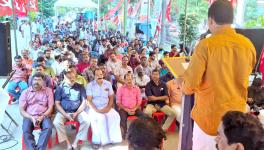Kerala Model of Internet of Things: Lesson for Other States
The cities and state governments across the country can embark on the path of providing cheap data services to its citizens by investing a little amount in the infrastructure, the Left Democratic Front government in Kerala has shown the way. The government has cleared a free optic fibre network (KFON) project worth Rs 1,548 crore in the state. The project is supposed to provide high speed internet to over 20 lakh below poverty line (BPL) households. This also brings forth good news for a number of cities in Kerala as on the basis of this network, the foundations of ‘smart city’ can be laid out. The foundation, if built by the state government can accrue large benefits to its citizens.
The entire infrastructure of smart cities is based on the laying of the fibre network, which is essential for building various layers of smart governance in the cities. The large multinational corporations are eyeing the Indian cities to open up and allow them to build this infrastructure so that massive expropriation of wealth can be done from these cities.
With the Kerala model, the companies that have internet service provider license can use the optical fibre network to provide their services in the state. The project will be implemented by the Kerala State Electricity Board and the Kerala IT Infrastructure Limited. This should be a win-win situation for the people of the state and the service providers with adequate check on the profitability from the internet of things.
The Bharatiya Janata Party (BJP) government’s smart city project in the country also emphasises on smart city networks with internet of things and smart control centres to monitor the city and ensure adequate smartness in utilities, their monitoring, etc. The major difference is that in the BJP model, the infrastructure will be laid out by the private operators, thus, this huge area of manoeuvring profitability and generating huge surplus will be with them (private operators).
Also read: Kerala Becomes First State to Make Internet Connection a Basic Right
It should be mentioned that the market for digital innovation is very big, and large companies are eyeing cities as potential spaces for maximising their profits through their interventions. It can come in the form of smart city projects, smart control command centre, putting cities under complete surveillance through the use of smart cameras, etc. Bloomberg reported that the internet of things (IOT) represents a $19 trillion opportunity. Forbes has estimated that the smart city industry is expected to become an over $1.5 trillion market by 2020. This new industry signals the privatisation and financialisation of public service provisions, and will accelerate the growth of inequality in our societies by bringing increased convenience and services to the wealthy few at the cost of the public as a whole.
However, the Kerala model of smart intervention can prove to be a major bulwark in the interest of the people to ensure that the bid to maximise of profits from the cities and the states is curbed. Since the fibre will be laid out by the state’s parastatal, it is easy for the state government and for that matter, the cities to have ensure that the surplus that gets generated from the cities is democratised in the form of cheap internet and its allied services. As mentioned, these services can be in the form of smart public utilities and their billing or smart transport in the cities. All of this can come at a relatively cheaper price to the citizens as one of the largest stakeholders in the project will be the state parastatal.
THE EXPERIENCE OF BARCELONA
The Barcelona city council had successfully launched an office for the unified management of public data. With the entire technological infrastructure and sensors spread across the city, the city was able to generate, collect, receive, catalogue, process and share lots of data that has high intrinsic value. Data, according to the city council, has become an infrastructure of interest to the public; a shared resource for the common good. It is the key to the city and can be used to take decisions more quickly and democratically, promote innovation, to achieve improvements to public services and to empower people.
FOR THE INDIAN CITIES
As is evident, the Indian cities are also allured by the smart city bandwagon. Hardly a few know that the main drivers behind this shift happen to be large companies that intend to operate in the cities with their tools and solutions to attain maximum profitability through the internet of things (IOT). The city and the state governments are forced to meekly surrender to their dictates on the pretext of smart solutions. Actually, in guise of these smart solutions, they lay control over the command centre of the cities and then through the massive flow of data earn huge profitability, about which the city governments are not even aware of.
However, the city governments can assert their right to have a fair share in the smart cities network. In Shimla, when the author (being the deputy Mayor of Shimla Municipal Corporation) was approached by a service provider to dig the city for laying of fibre cables the operator was not allowed to dig. Instead, he was asked to ensure that while laying ducts in the city, two ducts should be laid for the city government. The operator initially did not agree to the request, but when permission was denied for digging the trench for the laying of the ducts and fibre, he was forced to accept the offer. In many cities, the right of way still happens to be with the city government. Using this as a bargaining tool, the city governments can mount pressure on the service providers to have a fair deal of bargain so that the citizens are benefited.
Also read: World Cities Day: Can Technology Serve the Purpose?
The reality in Shimla city is that in case the city government now wants to run a smart solution command centre, it just has to throw open a bid for an equitable bargain with a service provider and can earn dividends which can be democratically passed on to the people in terms of data sharing and IOT, so that cheap and smart solutions are offered. In this way, the city can evade becoming a victim of the large multinational corporations who eventually run the city’s data network and virtually run a city through a proxy.
Get the latest reports & analysis with people's perspective on Protests, movements & deep analytical videos, discussions of the current affairs in your Telegram app. Subscribe to NewsClick's Telegram channel & get Real-Time updates on stories, as they get published on our website.
























